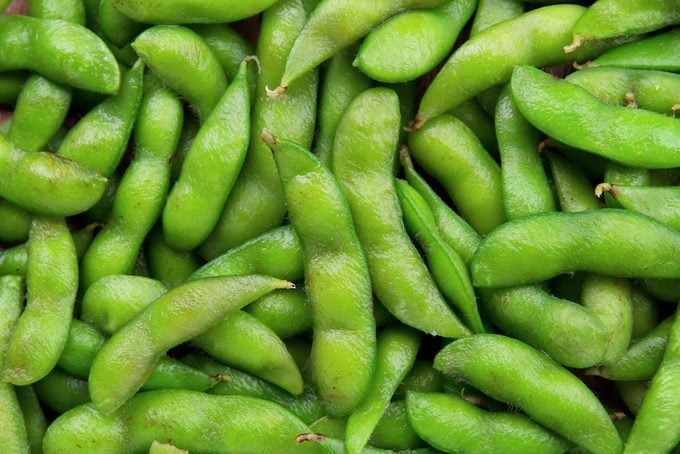What Soy Really Does to Your Body
Updated: Mar. 17, 2022
Is soy bad for you? Does it cause cancer? And what is soy in the first place? Here, top nutrition experts answer everything you ever want to know about the plant-based protein.
First off, what is soy? And is soy bad for you? The food is one of just a handful of complete vegetarian proteins. Soy products—such as edamame, tofu, and tempeh—contain all nine essential amino acids. Because your body is unable to produce these essential amino acids, they must come from food sources.
“Soy is nutrient-packed,” says Pamela Fergusson, RD, PhD, a dietitian in British Columbia. It’s an excellent source of satiating protein and also provides filling fiber. “And it has no cholesterol and is low in saturated fats,” adds Fergusson. You’ll get many other nutrients, too. A cup of shelled edamame is a good source of immunity-helping vitamin C, as well as iron—important for the health of red blood cells. Now that you know the answer to “what is soy?” read on to find out what happens to your body when you add it to your diet.
You’ll get a solid plant-based substitute
What is soy? “Because soy has an amino acid profile containing all the essential amino acids our bodies need, it substitutes nicely for animal protein—such as eggs, meat, fish, seafood, and dairy,” like these other top plant-based proteins, says Cathy Leman, RD, a dietitian and personal trainer in Glen Ellyn, Illinois.
Soy may help your cholesterol
“Regular intake of soy may help with reducing high blood pressure and low-density lipoprotein [LDL], aka ‘bad’ cholesterol,” says Fergusson. In fact, a review study in The Journal of Nutrition found that soy protein may significantly help decrease LDL cholesterol. Soy is also one of 13 foods that help to lower triglycerides naturally.
“We believe that soy protein foods are useful, even though their effects on serum cholesterol are small,” says David Jenkins, MD, PhD, study co-author of The Journal of Nutrition study and professor of nutritional sciences at the University of Toronto. “If you eat a number of heart-health-claim-approved foods, such as soy, nuts, oats, barley, and plant sterols as found in plant-sterol-enriched margarines, you can get a drug-like cholesterol reduction. So just because the effect on serum cholesterol is small, don’t dismiss these foods. Use a number of them in combination in your diet.”
Soy may help your heart
“Soyfoods boast a nutritional profile that makes them especially appealing to folks interested in eating a heart-healthy diet,” says Leman. “Whole soy foods have fiber, contain no cholesterol, and are low in saturated fat. Soy foods can replace less heart-healthy choices, like red and processed meats. Even though the U.S. Food & Drug Administration (FDA) has cited inconsistent findings in the research supporting the link between soy foods and heart health, soy foods are still considered good for heart health.”
In part, that’s because healthy cholesterol levels benefit heart health. Dr. Jenkins elaborates further: “Many experts believe that soy is good for the heart because meta-analyses of the effect of soy on cholesterol have consistently shown that soy protein reduces serum cholesterol,” he says.
In moderation, soy doesn’t cause cancer
Is soy bad for you? “A moderate intake of soy, which is two to three servings per day, is safe and does not increase the risk of developing breast cancer,” says Fergusson. “In fact, some specific soy research shows a decreased risk of breast cancer.” Eating soy can also benefit inflammation levels. In a study of more than 1,000 Chinese women in the Journal of the Academy of Nutrition and Dietetics, a higher soy intake was connected with lower levels of inflammation markers that are linked with chronic disease.
But it doesn’t reduce cancer risk
“In Asia, population studies link soy consumption with reduced breast cancer risk,” says Leman. “But there, soy is consumed in moderate amounts—one to two servings a day—throughout life. Cell and animal studies show soy compounds may slow cancer cell growth and prevent tumor formation.” While this sounds promising, Leman notes that “evidence is too inconsistent to conclude that soy reduces risk of breast cancer.”
 Eating soy could help prevent cancer recurrence, though
Eating soy could help prevent cancer recurrence, though
In a study published in The American Journal of Clinical Nutrition that looked at about 9,500 U.S. and Chinese breast cancer survivors, researchers found that eating soy foods with at least 10 milligrams of isoflavones daily was connected with a significantly reduced risk of breast cancer recurrence.
You can be allergic to soy
If you’re wondering, “Is soy bad for you?” the answer could be a hard yes, if you’re allergic to it. Soy is one of the top eight allergens in the United States—along with milk, eggs, peanuts, tree nuts, fish, shellfish, and wheat—according to the American Academy of Allergy, Asthma, and Immunology. “An allergy to soy is common in children,” says Leman. “Most children outgrow a soy allergy, though; carrying it into adulthood is rare” Signs and symptoms of a soy allergy include hives, itching around the mouth, wheezing, abdominal pain, skin redness, and in rare cases anaphylaxis. See a doctor if you have any of these symptoms.
Eating soy doesn’t cause early puberty
Does eating soy cause girls to get their periods early? While more research needs to be conducted in this area, preliminary science says no. In a study in Nutrition Journal, girls and teens eating high amounts of soy—more than the general U.S. population consumes—didn’t experience early onset of their periods.
You don’t need to worry about soy and estrogen
“There is a lot of fear around soy, mostly because it contains phytoestrogens,” says Fergusson. “Remember that these are plant estrogens and have a very weak estrogenic effect in the human body. There are many sources of plant estrogens, in addition to soy. For example, hops in beer contain a potent phytoestrogen. Further, animal products may contain mammalian estrogen. It is important to realize that when we ingest these hormones into our digestive systems, very little will pass into our circulatory systems.” To improve your health, add these best superfoods for women to your diet.
And eating soy won’t make a man less manly
When people wonder, “Is soy bad for you?” they may be worrying about the prospect of developing man boobs. “There’s confusion around soy and men’s health, indicating that soy food consumption could potentially lower testosterone levels,” says Leman. “Research doesn’t bear this out, concluding that soy intake doesn’t result in adverse effects associated with lower testosterone levels.” You may have read about a case report of a man who developed breasts while consuming soy. But that man was drinking an incredibly high—about a dozen cups—of soy milk daily.
Whole soy products can do your body good
What is soy that you should eat? “Talking about soy and breast cancer can feel like navigating landmines,” says Leman. “As a breast cancer survivor myself, this is an area where I do quite a bit of education. In my own diet, I include whole soy foods like tempeh, tofu, soy milk, edamame, and miso.” Fermented soy in tempeh may be easier to digest, adds Fergusson.
(Tempeh vs. tofu: here’s how they compare.)
Looking for ways to cook with soy foods? Give these easy recipes a try:
- Vanilla smoothie with edamame
- Healthy coffee smoothie with soy milk
- Bánh mì lettuce wraps with tofu
- Mediterranean vegetable salad with edamame
- Stir-fry with broccoli and mushrooms with tofu
- Vegan chocolate pie with tofu

